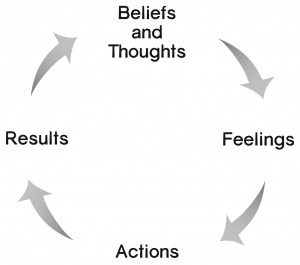Do you need to change your mindset? If you’re reading this article because you’re looking for a new way to think about food, it all starts with changing your mindset!
Your thoughts are more powerful than most people realize. In fact, you become what you think!
If you’ve been struggling with your eating but not getting the results you want, ask yourself what you were thinking first. That is the first step to change your mindset.
Your mental tape
Whether you are aware of it or not, you have a mental tape that is always running. This constant soundtrack affects your moods and ultimately, your behavior.
Pause for a moment to notice what’s playing on your soundtrack. When these thoughts are negative, outdated, or confining, they undermine the process of change. Without awareness of this mental chatter, you won’t really know why you do what you do.
Change your mindset, change your behaviors
Your thoughts are the primary creators of your emotions. Your thoughts and emotions inspire the actions that lead to your results. In Eat What You Love, Love What You Eat with Diabetes we call this Thoughts > Feelings > Actions > Result cycle TFAR:
Thoughts > Feelings > Actions > Results
Once you understand the Thoughts > Feelings > Actions > Results cycle, your behaviors will start to make more sense and you are able to reflect on the originating thoughts so you can change your mindset.
To elaborate, when you think a certain thought, it causes you to feel a certain way. (It is also important to know that sometimes we experience feelings then assign a thought to them!)
These thoughts and feelings cause you to act accordingly, whether in your relationships, your work, or your decisions about eating. These actions cause a certain set of results, and these results “prove” to you that your original thoughts were accurate.
In other words, you end up proving yourself right!
Over time, your thoughts become beliefs, so you don’t have to consciously think them anymore!
The Thoughts > Feelings > Actions > Results cycle applies to all your thoughts, not just those surrounding your diabetes self-management, eating, and physical activity.
The TFAR causal loop also applies to your thoughts about your relationships, your career, your finances, your appearance, and your abilities—any area of your life within your sphere of influence.
Why it’s so important to change your mindset
 These patterns of thinking become repetitive and habitual—in other words, your mindset.
These patterns of thinking become repetitive and habitual—in other words, your mindset.
And even when your mindset leads to results you don’t want, you may stay locked in its trap because it feels familiar and comfortable. Thousands of repetitions of a particular experience create auto-pilot thoughts, feelings, and actions, and therefore, predictable results.
The first step to change your mindset and disrupt an undesirable cycle is to start noticing your internal conversation. (It helps to “listen” as though you are an outside observer.) Once you are able to hear your self-talk, begin to notice the results that your mindset is creating.
When you recognize self-talk that is inaccurate, ineffective, or limiting, you can choose to change it and thereby change your outcomes. Just as the repetition of negative mantras become ingrained and results in undesirable outcomes, the repetition of new positive mantras will result in the opposite—and rewire your brain!
Fake it ’til you make it
The amazing this is, you don’t even have to believe what you’re saying to yourself at first. Just simply saying it is a powerful start.
The reason this is true is that your mind doesn’t tolerate incongruence; if your thoughts are saying something, your brain will find a way to make it true. In other words, “fake it until you make it.”
When you act “as if” it were true, it becomes true.
Your Inner Critic
There are many thought patterns or self-talk that keep you stuck in a rut.
Let’s focus on one for now: The Inner Critic. This type of self-talk is common in people with diabetes.
The Inner Critic is harsh and hyper critical, and wants to keep you in your comfortable rut. She says things like:
- “You’ll never learn to practice moderation when it comes to sweets.”
- “You’re too lazy to exercise.”
- “You’re too undisciplined to monitor your blood sugar the way you should.”
You may think you’re keeping yourself in line. But in fact, criticism is a poor long term motivator—even when you’re the one doing the criticizing.
Rather, this hypercritical self-talk will only cause you to feel of inadequate and hopeless. As a result, you won’t do your best or even try. Instead, you’ll just give up, proving to yourself that your Inner Critic was right. This leads to more harsh criticism and the cycle continues.
Positive self-talk will change your mindset—for good
To finally change this pattern, start using an encouraging, gentle inner voice to motivate yourself toward the positive changes you want. For example:
- “You’ve made other important changes in your life. It may take some practice but you can learn to eat moderately too!”
- “You will feel so much better if you take even just a short walk. Everyone has to start somewhere.”
- “You don’t need to be perfect! You learn so much when you check your blood sugar even once a day.”
The next time you find yourself eating in a way that feels out of control, uncomfortable, or unsatisfying, ask yourself what you were thinking before you took the first bite of food. Is it time to change your mindset?
Remember, ineffective self-talk can lead to uncomfortable feelings and overeating. When you practice catching these negative thoughts before they lead to ineffective feelings and behaviors, you can switch to a kinder, gentler, observing voice that coaches you toward the results you really want!
And that will be your first step on your journey of mindful eating.
Michelle May, MD is the co-author of Eat What You Love, Love What You Eat with Diabetes.
This article has been updated from a previously published version.
Enjoyed this article? Here are three more to help you:
You are not powerless over food!
In charge or in control—which are you?



